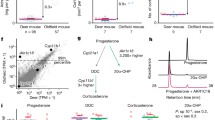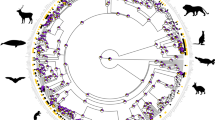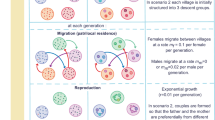Abstract
J. P. A. ANGSEESING1 is mistaken in most of his criticism of Kammerer's experiments as described by Koestler2. Angseesing quite reasonably supposes that the formation of nuptual pads on male midwife toads might involve a genetic mechanism activated by their confinement to aquatic conditions or high temperature. The crux of the argument, however, is the claim that this condition was inherited and intensified in successive generations. Any explanation must therefore involve selection or the inheritance of acquired characteristics, in addition to the probable physiological mechanism.
This is a preview of subscription content, access via your institution
Access options
Subscribe to this journal
Receive 51 print issues and online access
$199.00 per year
only $3.90 per issue
Buy this article
- Purchase on Springer Link
- Instant access to full article PDF
Prices may be subject to local taxes which are calculated during checkout
Similar content being viewed by others
References
Angseesing, J. P. A., Nature, 239, 408 (1972).
Koestler, A., The Case of the Midwife Toad (Hutchinson, London, 1971).
Waddington, C. H., The Strategy of the Genes (Allen and Unwin, London, 1957).
Wersky, P. G., Nature, 234, 489 (1971).
Author information
Authors and Affiliations
Rights and permissions
About this article
Cite this article
WALLACE, H. A Salamander Midwife. Nature 242, 134–135 (1973). https://doi.org/10.1038/242134a0
Received:
Issue Date:
DOI: https://doi.org/10.1038/242134a0
Comments
By submitting a comment you agree to abide by our Terms and Community Guidelines. If you find something abusive or that does not comply with our terms or guidelines please flag it as inappropriate.



